Jul 14, 2022
context
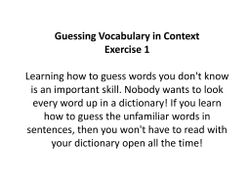
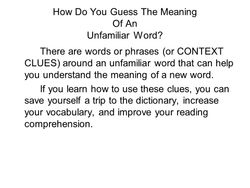
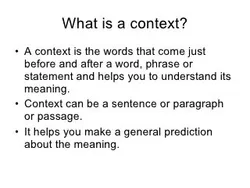
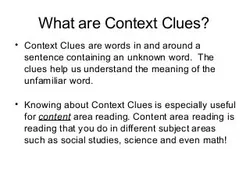
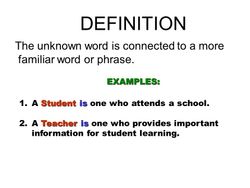
1. Definition context clue
The author includes a definition to help the reader understand the meaning of a word. In the following example, "tainted" is defined as having a disease.
The people of the town were warned not to eat the tainted fish. The local newspaper published a bulletin in which readers were clearly told that eating fish that had a disease could be very dangerous. This was especially true for fish caught in Lake Jean.
Definition context clues just spell out the meaning in a straightforward manner:
Definition: In Britain, they call the trunk of a car the "boot."
Definition: "The lingerie department," she directed the confused customer, "is where you'll find the bras and panties."
A synonym is one way to understand meaning. But, how about a straightforward definition? It’s hard to misconstrue a context clue when the actual definition is provided. Here are a few examples:
The manager wanted a weekly inspection, which is a methodical examination of all the equipment.
Diane was lethargic; she didn't have the energy to get out of bed.
The dates are listed in chronological order; they start at the beginning and end with the last event.
The doctor’s writing was utterly illegible; no one could read those scribbles.
She heard the cry of the banshee, a spirit that alludes to the death of a family member.
He knew his future was precarious and likely to fall apart.
2. Synonym context clue
The author includes a synonym to help the reader understand the meaning of a word. A synonym is a word that means the same as or nearly the same as another word. In the following example, the synonym "pity" helps the reader understand the meaning of "compassion."
After seeing the picture of the starving children, we all felt compassion or pity for their suffering.
Synonym context clues offer words nearby with the same meaning:
Synonym: The annual bazaar is scheduled for the last day of school. It's always a fun festival.
Synonym: "That charlatan!" he cried. "That absolute fake!"
Antonym context clues offer nearby words with opposite meanings.
Antonym: "You look pretty content about it, not like you're all bent out of shape at all," he noted.
Antonym: "No, no, that didn't literally happen," she said. "I was speaking figuratively."
The most basic, and perhaps helpful, type of context clues are synonyms. If you can’t decipher a meaning, adding a few synonyms, or words with similar meanings, is a surefire way to point to a word’s meaning. Let’s take a look at a few examples:
It was an idyllic day - sunny, warm, and perfect for a walk in the park.
She hums continuously, or all the time, and it annoys me.
The crime he committed was egregious; he’ll never recover from this horrendous scandal.
His animosity, or hatred, of his sister divided the family.
Bill felt remorse, or shame, for his harsh words.
This situation is a conundrum, a puzzle that’s difficult to solve.
3. Antonym context clue
The author includes an antonym to help the reader understand the meaning of a word. An antonym is a word that means the opposite of another word. In the following example, the antonym "eager" helps the reader understand the meaning of "reluctant."
Joe was reluctant to take on the position of captain of the basketball team. He was afraid that the time it would take would hurt his grades. On the other hand, Billy was eager for the chance to be captain. He thought that being captain of the team would make him very popular in school.
Sometimes, the best way to understand something is to understand what not to do or what something isn’t. In the same way, an antonym, or an opposite, can convey meaning. If you point out the differences, you can come to understand each component better.
Marty is gregarious, unlike his brother who is quiet and shy.
Attempting to avoid the accident was futile; it was impossible for either of them to stop in time.
This painting of the landscape is picturesque, while the one of the old house is just plain ugly.
The feral cat would not let us pet him, unlike our friendly cat.
Our sweltering summer days were quickly replaced by the cold flashes of fall.
She was virtuous, unlike her evil and conniving brother.
4. Description context clue
The author includes one or more descriptions to help the reader understand the meaning of a word. In the following example, descriptions of President Kennedy as having charm, enthusiasm, and a magnetic personality help the reader understand the meaning of "charismatic."
John Fitzgerald Kennedy, our 35th president, improved human rights and equal rights for all people. He was a very charismatic president. People were attracted to his charm and enthusiasm. His personality was described as magnetic.
An explanation or illustration can also show the context of the word:
Explanation: She looked at the random collection that had been thrown in the packing box at the last minute—from toothpaste and razors to spatulas and sticky notes. "Well, that's quite a melange, isn't it?" she remarked.
Explanation: "No, no, that's just a crane fly, not a gigantic mosquito," he explained.
5. Summary context clue
The author makes a number of statements that help the reader understand the meaning of a word. In the following example, statements about being rude, showing no respect, having poor manners, and being impolite help the reader understand the meaning of "impertinent."
Andrea was a very impertinent young lady. She was so rude that she talked while her teacher was explaining a lesson. She showed no respect for other students. Her manners were very poor. Even her parents thought that Andrea was impolite.
Has a friend or family member ever asked you to just come right out with it? Sometimes, readers don’t want to search for your meaning. Instead, if you provide a bigger picture and offer added detail or context, the reader will come to understand the tricky word. Here are some examples:
The team was elated because they just found out they placed in the semifinals.
During the demonstration, a skirmish broke out so the police were called to restore order.
We know the dog has a kind disposition because we’ve never seen her bite or scratch anyone.
I called him a nuisance because he annoyed me with his incessant line of questioning.
Something in the refrigerator is so putrid, a wave of odor wafted out when we opened the door.
It’s no surprise he winced in pain after hitting his thumb with the hammer.
6. Visual context clue
The author includes a picture, drawing, chart, graph, or other type of visual to help the reader understand the meaning of a word. In the following example, the picture and its caption that is close to the sentence helps the reader understand that "exultant" means great joy.
Peggy had an exultant look on her face.
Using the context clues provided by authors can help you learn the meaning of many new words.

Word-structure clues are understood in two ways: a reader or listener understands a base word and a prefix (or suffix) and infers the meaning from the combination of the two, or the reader knows a word origin and upon hearing a word of similar origin, infers its meaning.
For instance, if you know that "anti-" means against, it's easy to infer the meaning of the word "anti-establishment."
Word-structure: The anti-establishment protesters picketed the town hall.
Likewise, if you're aware that a "memorial" is something in remembrance for a person who has died, you might readily intuit the meaning of the following sentence, even if you'd never previously heard the term "in memoriam."
Word-structure: The book was dedicated in memoriam of his father.
Comparison context clues show the meaning of a word through similarities to other items or elements, similies or metaphors:
Comparison: He looked absolutely flummoxed, like a toddler staring down at his feet on the floor who just isn't sure about this whole "walking" thing.
Comparison: "No," she said, "I'm as carefree about it as a bird floating among the clouds."
Contrast context clues show meaning through dissimilar elements:
Contrast: "It isn't exactly the melee that I expected from your description," he said. "The kids are just roughhousing a little. I expected them to be bruised and bleeding."
Contrast: I know she said she could reconstitute the dried fruit, but a soggy raisin just isn't a grape.
Learning new words from context alone does have its limitations, as this method is not always definitive. Often, context may give a reader a general idea of a word, but not a full meaning. If the sentences in which an unknown word appears don't clearly spell out it's meaning, that meaning may be lost. For long-term retention, readers need to see a word multiple times. The more often an inferred definition is included, the more likely the reader will retain and understand a new word.
By undefined
22 notes ・ 726 views
Korean
Upper Intermediate